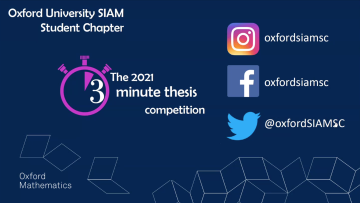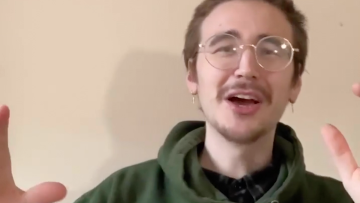To gain an insight in to mathematical student life under lockdown, we asked Oxford Mathematics and St Peter's College 2nd Year Undergraduate Matt Antrobus to provide us with one-minute updates over the course of last term.
So he did in a very personable and honest way, describing the maths he is doing, how he is doing it and how much work is involved. Matt also reflects on the stark fact that over half his time in Oxford has been under the cloud of Covid.
14:00
On generalised Nash equilibria and their application to pricing in the power market
Abstract
A link for this talk will be sent to our mailing list a day or two in advance. If you are not on the list and wish to be sent a link, please contact @email.
Classifying simple amenable C*-algebras
Abstract
C*-algebras provide non commutative analogues of locally compact Hausdorff spaces. In this talk I’ll provide a survey of the large scale project to classify simple amenable C*-algebras, indicating the role played by non commutative versions of topological ideas. No prior knowledge of C*-algebras will be assumed.
Classifying spaces of low-dimensional bordism categories
Abstract
The d-dimensional bordism category Cob_d has as objects closed (d-1)-manifolds and as morphisms diffeomorphism classes of d-dimensional bordisms. For d=1 and d=2 this category is well understood because we have a complete list of all 1 or 2-manifolds with boundary. In this talk I will argue that the categories Cob_1 and Cob_2 nevertheless carry a lot of interesting structure.
I will show that the classifying spaces B(Cob_1) and B(Cob_2) contain interesting moduli spaces coming from the combinatorics of how 1 or 2 manifolds can be glued along their boundary. In particular, I will introduce the notion of a "factorisation category" and explain how it relates to Connes' cyclic category for d=1 and to the moduli space of tropical curves for d=2. If time permits, I will sketch how this relates to the curve complex and moduli spaces of complex curves.
Tail equivalence of unicorn paths
Abstract
Let S be an orientable surface of finite type. Using Pho-On's infinite unicorn paths, we prove the hyperfiniteness of the orbit equivalence relation coming from the action of the mapping class group of S on the Gromov boundary of the arc graph of S. This is joint work with Marcin Sabok.
Exponential mixing of the geodesic flow on geometrically finite hyperbolic manifolds
Abstract
The geodesic flow on hyperbolic finite-volume hyperbolic manifolds is a particularly well-studied dynamical system; this is in part due to its connection to other important dynamical systems on the manifold, as well as orbital counting and other number-theoretic problems related to discrete subgroups of orthogonal groups. In recent years, there has been some interest in generalizing many of the properties of the geodesic flow on finite-volume manifolds to the infinite-volume setting. I will discuss joint work with Hee Oh in which we establish exponential mixing of the geodesic flow on infinite-volume geometrically finite hyperbolic manifolds with large enough critical exponent. Patterson-Sullivan densities and Burger-Roblin measures, the Lax-Phillips spectral gap for the Laplace operator on infinite volume geometrically finite hyperbolic manifolds, and complementary series representations are all involved in both the statement and proof of our result, and I will try to explain how these different objects are related in this setting.
tmf resolutions
Abstract
I will discuss recent progress on understanding the tmf-based Adams spectral sequence, where tmf = topological modular forms. The idea is to generalize the work of Mahowald and others in the context of bo-resolutions. The work I will discuss is joint with Prasit Bhattacharya, Dominic Culver, and J.D. Quigley.



